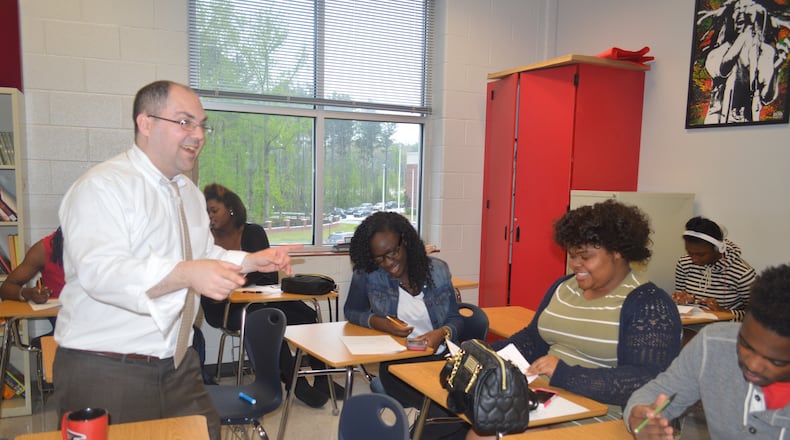Among the four teachers nationwide winning a $25,000 Fishman Prize this morning for classroom excellence was Matthew Patterson, who teaches language arts at Banneker High School in south Fulton.
The award honors teachers in high-need, Title I eligible schools. Along with the cash prize, Patterson will attend a TNTP summer residency. (Patterson already has had his share of national attention. A student-shot video of his emotional reaction to the news that musical legend Prince died went viral last month. You can even read about him in the British press.)
Finalists for the Fishman award included Carla McCall, an 8th grade math teacher at Crawford W. Long Middle School in Atlanta. The prize is named for engineer-turned-teacher Shira Fishman , who teaches at McKinley Technology High School in Washington, D.C.
Fishman was the District of Columbia's 2011 Teacher of the Year, a 2011 Milken Educator Award winner, and the only teacher in the district to earn a perfect score in her official classroom observations under the district's rigorous IMPACT evaluation system. Fishman explained her teaching approach in a widely quoted essay, "The First Five," which outlines how she creates a culture of learning during the first five minutes of each period.
I thought her essay was fascinating. Here is an excerpt:
But if you can create an urgent classroom culture, where each student is busy from the moment they enter, that energy will be infectious and tends to remain high throughout the lesson. I want every student in my class to feel that urgency and I try to instill in them the belief that every minute in this classroom is precious.
These first five minutes are a chance to reinforce what it means to be in my class. I am not striving for order or busy-ness. I create organized chaos with several things happening at once, all built around a strong sense of urgency.
Things are getting done. By the time the warm-up is complete, my students have gathered their supplies, revisited key content from previous lessons and connected prior knowledge to the upcoming lesson, all while tackling a challenge problem in mixed-level learning groups. At the same time, I have evaluated how much knowledge my students have retained from previous lessons, taken attendance, checked homework, logged missing assignments and had a brief conversation with nearly every student.
For me, the first five minutes aren't a throw away – they are the main event.
I hope to talk to Georgia's Fishman winner soon. The TNTP publicist shared some amazing details about Patterson, including this one: "In the last eight years, he has written zero classroom referrals for discipline-related issues — an uncommon record at his school and a testament to the positive culture of his classroom."
In the meantime, here is Patterson's bio:
Alongside his colleagues, Matthew, who also has a master's degree from Agnes Scott College, has been working to change the school's reputation: For six of his 10 years at Banneker, his students have been the only students in the school to pass any A.P. exam. Matthew believes that a trusting and thriving classroom culture is key to academic success. Under his leadership, his students see a drastically lower occurrence of discipline referrals than before entering his class.
If you ask Matthew about these accomplishments, he will give all credit to his students. "I'm the only thing that keeps us back," he says. "The students are ready to rock."
A big reason for Matthew's success is his unwavering belief in his students' abilities to exceed expectations, and his ability to give them access to challenging content framed in an engaging context. On any given day in his class, students might discuss the Atlanta hip-hop duo Outkast and German philosopher Jurgen Habermas in the same lesson. A classroom Twitter feed allows students to correspond with journalists and novelists and serves as a real-time window for parents to check in on their children's progress.
At Banneker, Matthew is co-chair of the English Language Arts department, whose students have scored higher than any other department in the building for years. His wide taste in literature is responsible for transforming the school's English Language Arts curriculum from one that wasn't very diverse to one that includes books specifically chosen for both academic rigor and relevance to his students' experiences. "He works hard to be a transformative teacher, and our students truly love him," says his assistant principal.
About the Author
Keep Reading
The Latest
Featured




